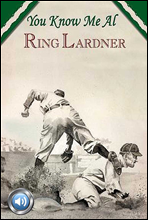
나는 신출나기 투수 (You Know Me Al) 들으면서 읽는 영어 명작 387
- 저자
- 라드너 (Ring Lardner) 저
- 출판사
- 유페이퍼
- 출판일
- 2016-10-13
- 등록일
- 2017-06-07
- 파일포맷
- EPUB
- 파일크기
- 6MB
- 공급사
- YES24
- 지원기기
- PC PHONE TABLET 웹뷰어 프로그램 수동설치 뷰어프로그램 설치 안내
책소개
--------- 오디북 북 + 이북이 / 하나로 = 입체전자책 ----------- - 전자책과 오디오북이 하나로 합쳐진 입체전자책 - 영어 학습을 위한 최고의 입체 전자책입니다. - 읽으면서 한 번의 클릭으로 동시에 듣습니다. (크롬 환경 최적격) - 주제(Chapter) 마다 한 번의 클릭으로 편리하게 들을 수 있습니다. - 핸드폰도 편리하며 CD가 필요 없습니다. - 추천작이며 엄선된 작품입니다. - ★ 보이스 전체를 다운로드 받아서 편리하게 들을 수 있습니다 ★ ------------- Audio book + e book = solid book -------------- ★ 부록에 『영문학 역사 (ENGLISH LITERATURE) 』- 첨부 / 4500원 (보이스 있음) 영미문학에서는 기본적으로 읽어야 하는 책입니다. 아직도 많이 읽히고 있으며 영어 공부를 하거나 영어 상식으로 충분히 가치있는 책입니다. ----------------------------- 저자는 매우 재능있는 이야기군이며 사투리를 잘 구사 한다. 신문사에 일하며 야구에 관계되는 기사를 전담했다. 스포츠 해설가로 이름을 날렸다. 1914년에 소설을 출간하기 시작 하며 익살스런 야구선수 잭 키프에 관한 단편으로 성고을 거두었다. 그 일부가 〈나는 신출나기 투수 You Know Me Al〉(1916)에 실렸다 "You Know me Al" is a classic of baseball--the game and the community. Jack Keefe, one of literature's greatest characters, is talented, brash, and conceited. Self-assured and imperceptive, impervious to both advice and sarcasm, Keefe rises to the heights, but his inability to learn makes for his undoing. Through a series of letters from this bush-league pitcher to his not-quite-anonymous friend Al, Lardner maintains a balance between the funny and the moving, the pathetic and the glorious. Nostalgic in its view of pre-World War I America--a time before the "live" ball, a time filled with names like Ty Cobb, Charles Comiskey, Walter Johnson, and Eddie Cicotte--this is not a simple period piece. It is about competition, about the ability to reason, and most of all it is about being human. First published in 1914, "You Know Me Al" says as much to us about ourselves today as it did seventy-five years ago. [예스24 제공]





